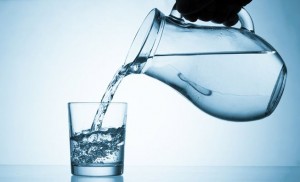How much water should you drink in a day?
The advice you’ve heard for years may no longer hold true.
by Chanie Kirschner
I know. The Gazette has already put up half a dozen “how much water should you drink” articles, but they keep writing them so we reprint one now and then. This article is helpful if you want to know how much water someone at the Mayo Clinic who has never seen you and knows nothing about you thinks you should drink if you are pregnant and how much you should drink if you aren’t pregnant. The Gazette’s advice on the topic, and we’ve been consistent on this since they started writing ” how much water” articles, is get a drink whenever you’re thirsty. –Hardly Waite.
Everyone’s heard the old refrain — drink eight 8-ounce glasses of water a day. Turns out that’s not entirely accurate. The Mayo Clinic recommends about 13 cups a day for an average male and about nine cups a day for the average female. But the actual amount of water a person should drink in a day can vary based on where you live, how much you weigh, and what kind of lifestyle you lead.
Water makes up 60 percent of our body’s weight and is absolutely imperative for our organs to function. Since we are constantly losing water through sweat, urine and even our breath, drinking enough water is crucial. If you become dehydrated, you will lose energy and become nauseated, headache-y, and tired. Severe dehydration can even send you to the hospital so drinking an adequate amount of water is crucial to maintaining your health on a daily basis.
If you exercise, you are losing more water than the average person. Therefore, it’s important to drink water before, during and after your workout — an extra 1 1/2 to 2 1/2 cups should be sufficient for a short workout. If you’re doing prolonged exercise, like running in a marathon, you have to drink much more than that.
In the summertime or if you live in a warm climate, you’ll also need to drink more water than the recommended amount. That’s because heat can make you sweat more and lose fluids faster.
You’ll also need to drink more water than is usually recommended if you’re sick with a fever, vomiting or diarrhea. If all you’ve got is a pesky cold, drinking water can also help keep your nasal passages hydrated and prevent you from getting sicker.
Another instance where you need to drink more water? If you’re pregnant or breastfeeding. The Mayo Clinc recommended that a pregnant woman drink at least 10 cups of water a day and a nursing woman to drink 13 cups of water a day. That’s because nursing drains your body and can leave you dehydrated if you’re not drinking enough. Not to mention that adequate hydration while breastfeeding can ensure an ample milk supply. When I had my last child, the hospital lactation specialist told me to drink one cup of water each hour of the day from 7 a.m. to 9 p.m. — that’s a lot of water!
How do you know if you’re drinking enough? You can count the cups you drink or you can just peek in the toilet after you pee — you should be peeing a clear or light yellow liquid. If your urine is dark yellow or cloudy, you definitely are not drinking enough.
This is a lot of water to drink for physical health, but drinking water can have an influence on your emotional health as well. A 2014 study found that, if you’re not drinking enough water, drinking more water will better your mood and increase general positive emotions. If you’re already drinking a good bit of water during the way, keep it up! The same study found that folks who drank a high amount of water over the course of the day experienced a decrease in their happiness levels if they decreased their water intake.
If water isn’t your thing, you can also safely substitute juice, milk or coffee for a cup or two a day. Since I was never a major water drinker, I like to combine 1/3 cup juice with 2/3 cup water. My husband says I like to drink juice that way because I grew up on watered-down juice from a can. Maybe. But at least it helps me meet my daily water intake goal!
Source: Mother Nature Network.





